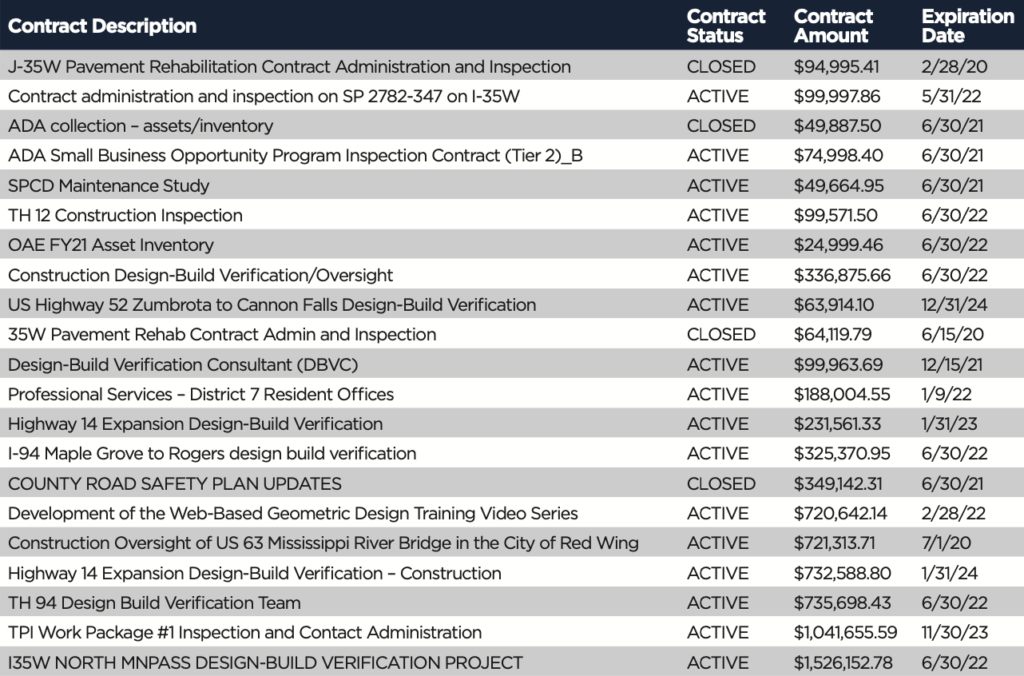Road grader
The state senator who supports transportation legislation that earns herself millions.
Minnesota’s weak conflict of interest laws rely on the honor system — elected officials are supposed to let the public know when they might benefit financially from an official vote or action. But what happens when those in the honor system lack honor?
A DFL state senator recently voted for a $6.4 billion transportation bill without telling anyone the company she owns received over $7 million in state transportation contracts over the last five years.
Sen. Ann Johnson Stewart, DFL-Wayzata, owns Professional Engineering Services LLC (PES), which garnered $7.6 million in taxpayer dollars from 21 different contracts over the last five years, according to Minnesota Department of Transportation records. Her latest vote guarantees the money will keep coming.
Stewart lists PES on her annual Statement of Economic Interest filed with the Minnesota Campaign Finance and Public Disclosure Board, which requires public officials to disclose the source of any income over $50. The only other source of income listed on her statement is the University of Minnesota, where she is an adjunct faculty member.
Her advocacy for transportation should not surprise her constituents because during the 2020 campaign she called herself a “passionate transit advocate” and promised to “steer funding to address our traffic problems.”
Looks like some of that $6.4 billion in transportation funding could be “steered” into her own pocket.
Stewart’s campaign website boasts that her engineering company “worked on the design and construction of the three Minnesota light rail lines to date, as well as on Bus Rapid Transit (BRT) and other transit facilities.” She bragged during the campaign: “I’m proud to say that I’ve grown this company myself from just me to now 27 employees. We provide construction inspection and materials testing mostly for the state.”
Center of the American Experiment then found, through a public records request, that PES worked on 21 contracts for the Minnesota Department of Transportation over the last five years, totaling $7,631,118.91.
Stewart should clarify whether PES — which relies on projects “mostly from the state” — will bid on future projects funded by the bill she just supported. And she didn’t just vote for it. She advocated for its passage, saying: “We need more construction, we need more funding, a gas tax. I’m excited that I can lend my expertise.” She closed her comments with, “I, too, will be voting green on this vote.”
Stewart is not the first legislator to face a vote that can potentially benefit her or her family. Every year, the topic of conflict of interest comes up in discussions at the Capitol. Can teachers vote for the education bill? Can farmers vote for the agriculture bill? The test is simple: If you are a member of a class (teachers) and the entire class is impacted the same, you are not in conflict. If you benefit specifically (like the owner of a company with a contract), then you are in conflict.
She could have observed her colleague from Red Wing, Sen. Mike Goggin, when he occasionally declared a conflict and publicly excused himself from voting on matters that benefit his employer, Xcel Energy. State law regarding conflicts of interest is pretty clear:
Subdivision 1. Disclosure of potential conflicts.
(a) A public official or a local official elected to or appointed by a metropolitan governmental unit who in the discharge of official duties would be required to take an action or make a decision that would substantially affect the official’s financial interests or those of an associated business, unless the effect on the official is no greater than on other members of the official’s business classification, profession, or occupation, must take the following actions:
(1) prepare a written statement describing the matter requiring action or decision and the nature of the potential conflict of interest;
(2) deliver copies of the statement to the official’s immediate superior, if any; and
(3) if a member of the legislature or of the governing body of a metropolitan governmental unit, deliver a copy of the statement to the presiding officer of the body of service.
If a potential conflict of interest presents itself and there is insufficient time to comply with clauses (1) to (3), the public or local official must orally inform the superior or the official body of service or committee of the body of the potential conflict.
(b) For purposes of this section, “financial interest” means any ownership or control in an asset that has the potential to produce a monetary return.
In addition to state law, Senators also have their own rule governing conflicts of interest:
Rule 56.4 Members of the Senate shall disclose potential conflicts of interest in the discharge of senatorial duties as provided in Minnesota Statutes, section 10A.07.
Stewart is in violation of state law and Senate rules both through her failure to publicly disclose her conflict of interest and through her vote for the Transportation spending bill, which clearly benefits her and her family. The public can be well-served when elected officials have a diverse variety of knowledge and experiences. But only if the public understands the motivation and potential conflicts behind their advocacy and votes.
Capitol insiders suspect the Senate Ethics Committee will soon have a juicy investigation on its agenda. Unless she quietly sold her company after the election, that committee will demand that Stewart come clean about her current sources of income and explain to her constituents in Plymouth, Minnetonka and Woodland how her votes for transportation funding are benefiting her family.
